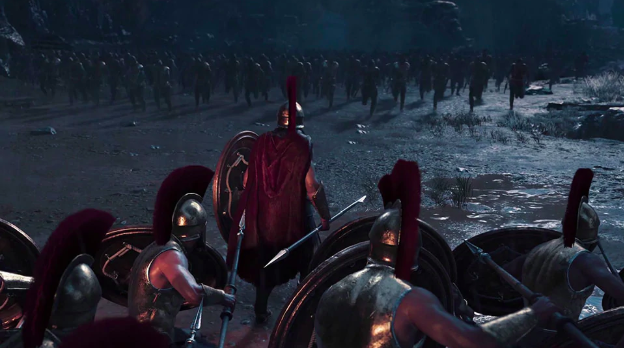Ubisoft Offers More of the Same With Assassin’s Creed: Odyssey
Ancient Greek culture contributed myths, mathematics, architecture and democratic ideas that are essential in our modern world. This makes ancient Greece a pretty neat setting for Ubisoft’s prestigious franchise Assassin’s Creed: Odyssey.
The game designers did a great deal of research and used realistic art to make the architecture and landscapes historically accurate.
Sound design is on point. The music is as good as in last year’s Assassin’s Creed, albeit with different instruments and tone. The tunes are loud, rowdy and exciting guitar music. Voice acting is authentic and reflects the setting.
The plot of Odyssey is not surprising. Since this game is an RPG, the story is built so the player may choose different paths. Unfortunately, its structure lacks heavy symbolism and depth.
Dialogue, on the other hand, is phenomenal for the same reason that the story is average. The player chooses what to say, and dialogue options are not deceptive as notoriously noted in other RPGs.
This system is fun because the player is not passive; you have agency. The game regularly throws interesting choices your way. For example, walking through a razed village, I found a family about to be slaughtered because they were thought to be carrying a plague. Now, I could save them, but that could mean an outbreak of a disease.
I could let them die, but there were children in that family. I chose to let them die, thinking I would save countless more lives. A consequence of this is that the young girl my character had been taking care of like a daughter saw me make this decision, which led to the death of her friend. That was an awkward conversation.
That is what makes this game interesting: the emergent narrative and tough decisions makes it stand out from other Assassin’s Creed games.
On that note, the world of Odyssey is built to be explored. You can’t go ten feet without finding something of interest, whether it be a bandit camp, a tomb or a town. Bards sing tales on the side of the road, soldiers patrol the streets, and merchants sell their wares in this detailed classical world.
The developers of Odyssey brought the franchise’s famous ship mechanic to the forefront. Early in the game, the player is given a ship and crew to command. You can chart the seas, fight pirates and scrounge up buoyant loot while sailing the Mediterranean. In addition, players may also employ enemies to join their crew, but you’ll have to incapacitate them first.
To my dismay, the meat of the gameplay feels watered down. There are three general playstyles: melee combat, archery and stealth. Stealth hasn’t seen much innovation in Assassin’s Creed besides some rather creative new abilities, such as teleport takedowns.
However, archery mode feels like a deviation from Assassin’s Creed Origins. In Origins, there were four types of bow, but in Odyssey there is one bow with four abilities. I personally liked the four types of bow, because it made choosing a bow feel more significant than choosing the one with better stats.
Combat is probably the most fun playstyle, but feels simplified due to the new gear system, which I’ll get to in a bit. Combat involves high mobility and strategically prioritizing foes. It can get a bit chaotic with a lot of enemies, but the fighting is thrilling.
The gear system for weapons and armor is terribly downgraded. In Origins, gear had definitive properties. You can choose a pair of daggers could have instant charged heavy attacks, or a cursed sickle sword that does triple damage but lowers your max health to a third.
Odyssey instead has engravings, which provide small percentage increases in things such as damage and critical hit chance. For instance, you can choose a sword that boosts archery damage by five percent. While this system is not as impactful as the one in Origins, it does allow you to spend resources to add engravings to your gear by choice, which is a nice change.
Assassins Creed Odyssey is a good game, but it feels a bit too much like Origins, or any other Ubisoft game for that matter. Between Ghost Recon, Far Cry and Assassin’s Creed, Ubisoft has seemingly regurgitated the same game in the last few years: open world titles with a spread focus between loud guns-blazing combat and cunning stealth operations.
The casual player will likely enjoy Odyssey. For avid game players who like to keep up with the triple-A releases, this game may blend in with all those other Ubisoft games and feel stale. I fall into the latter category, and I give Assassins Creed Odyssey a 68/100.

Joey began writing for the Beachcomber in 2017. He covers movie and game reviews. In addition to writing for the Beachcomber, he plays video games.













